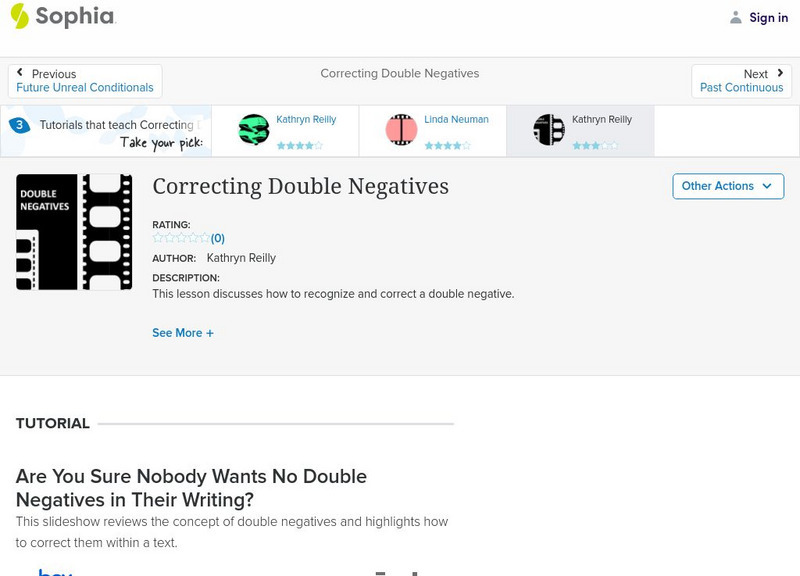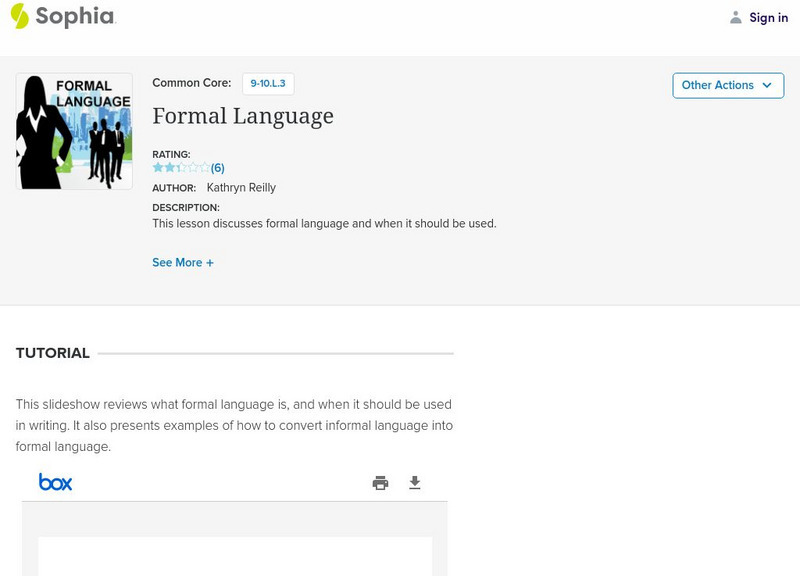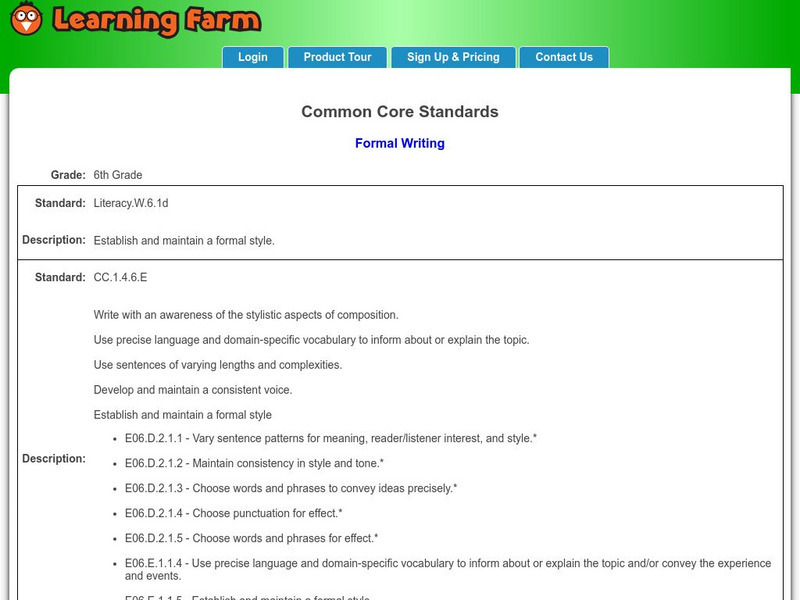Hi, what do you want to do?
Curated OER
Formal and Informal Language
“C u l8r @ skool.” As part of a study of formal and informal language, class members examine excerpts from Lil’ Boosie lyrics, the Emancipation Proclamation, a speech by Martin Luther King. Links to the resources not provided; however,...
Curated OER
Formal and Informal Language
Use this resource to prepare your class for an interview unit, a presentation activity, or to simply rid their writing of informal expressions. It prompts learners to identify whether listed expressions are formal or informal. Note: The...
Curated OER
Humor, Rhetoric, and Prose Styles
A handful of quotes are presented in these slides referencing writing and rewriting. Learners will be encouraged by well-known writers to practice, grow and refrain from perfectionism. Quotes also reference how to write for your audience...
Department of Defense
Do Dea: Conventions
Sharpen your use of the formal conventions of English with this self-guided learning module. The module focuses on formal and informal language, making pronouns agree with their antecedents, and common spelling and grammar errors. At the...
Better Lesson
Better Lesson: Audience, Tone, and Style in Informative Text
Learners will read samples of informative writing and highlight examples of how tone and style are used by the authors. Students will then apply this knowledge by writing their own informative text. Multiple examples of student work and...
BBC
Bbc: Skillswise: English: Formal and Informal Speaking Quiz [Pdf]
Assess the differences between formal and informal speech. Three levels of difficulty with answers provided.
CPALMS
Cpalms: The Lesson Formerly Known as "Wassssuuup"
[Free Registration/Login Required] In this lesson, students are actively engaged in learning how formal and informal language are used in written and oral communications. Downloadable handouts are provided.
BBC
Bbc: Skillswise: Speaking and Listening: Formal and Informal Speaking
This Skillswise site focuses on formal and informal speaking. Included are a video about how to decide whether to use formal or informal speech, fact sheets and worksheets for instruction. The Skillswise sites from BBC are geared to...
Online Writing Lab at Purdue University
Purdue University Owl: Academic Writing: Levels of Formality
Basic information explaining how the context, i.e., the audience and your purpose, determines whether you should use formal, semi-formal, or informal language. The links on the sidebar provide much more information about formal academic...
Grammarly
Grammarly Handbook: Informalities
A list of style techniques (with examples) used to create an informal tone in a written piece.
Grammarly
Grammarly Blog: Anymore vs. Any More
This page explains the use of "anymore" in informal writing, but in formal writing and anywhere else, "any more" is preferable. Examples are provided.
Grammarly
Grammarly Blog: Anytime vs. Any Time
This page focuses on changes in language usage pertaining to "anytime" and "any time." In informal writing "anytime" can be used, but in formal writing "any time" is perferable. Examples are provided.
Grammarly
Grammarly Blog: Anyway, Anyways, or Any Way
This page focuses on formal and informal use of "anyway," anyways," and "any way." Anyways is very infomal and should not be used; "anyway" is correct to mean "in case of" and "any way" should be used for all other situations. Examples...
Other
Pitner's Potpourri: Formal and Informal Language
A Common Core teacher resource provides an approach to educating students on the differences between formal and informal language.
Sophia Learning
Sophia: Correcting Double Negatives
This slideshow lesson focuses on fixing double negatives. It starts by showing what a double negative really says and how to make it say what they mean. It discusses why they are not used, when they can be used in writing, a list of...
Sophia Learning
Sophia: Correcting Double Negatives
This slideshow lesson focuses on double negatives. It includes defining the term, explaining why they aren't used, providing a list of "no" words, offering ways to correct them with examples, and listing steps to eliminate them in writing.
Sophia Learning
Sophia: Formal Language
This slideshow lesson focuses on formal language. It reviews the basics of formal language and the need to know your audience. It explains how to change various types of informal language into formal language and provides examples....
Sophia Learning
Sophia: One vs. You
This slideshow lesson focuses on the use of "one" and "you." It defines each, explains the differences, tells when to use each, and provides examples.
Sophia Learning
Sophia: Appropriate Language
This lesson focuses on using appropriate language in formal writing; it discusses pretentious language, jargon, and cliches. It defines each, provides examples, and explains why and how to avoid each. SL.9-10.6 Adapt to task/formal
Other
Match the Memory: Formal vs Informal Language
Match the Memory Interactive game where players match a word to either formal or informal language.
Grammarly
Grammarly Handbook: Cliches
This page focuse on cliches and explains why they should not be used in formal writing; it provides examples of other words to get the point across more clearly.
Learning Farm
Learning Farm: Common Core Standards: Formal Writing
Writing formally means writing using words that are precise, objective, and impersonal. This lesson gives examples of formal language and also provides games and a test. CCSS.ELA-Literacy.WHST.6-8.2.e
Online Writing Lab at Purdue University
Purdue University Owl: Using Appropriate Language
Knowing the right language for your particular audience is a necessary skill for all writers. No one wants to offend their audience or appear as though they don't know their content. Learn these rules of thumb to become more familiar...
BBC
Bbc Bitesize: Speaking and Listening: Standard English
Explains what standard English is and when it is used, the difference between formal and informal language, and non-standard forms of English such as those found in dialects.










![Bbc: Skillswise: English: Formal and Informal Speaking Quiz [Pdf] Unknown Type Bbc: Skillswise: English: Formal and Informal Speaking Quiz [Pdf] Unknown Type](http://lessonplanet.com/content/resources/thumbnails/411268/large/bwluav9tywdpy2symdiwmduymc0ymtiwny1jegxunwmuanbn.jpg?1589993555)
















